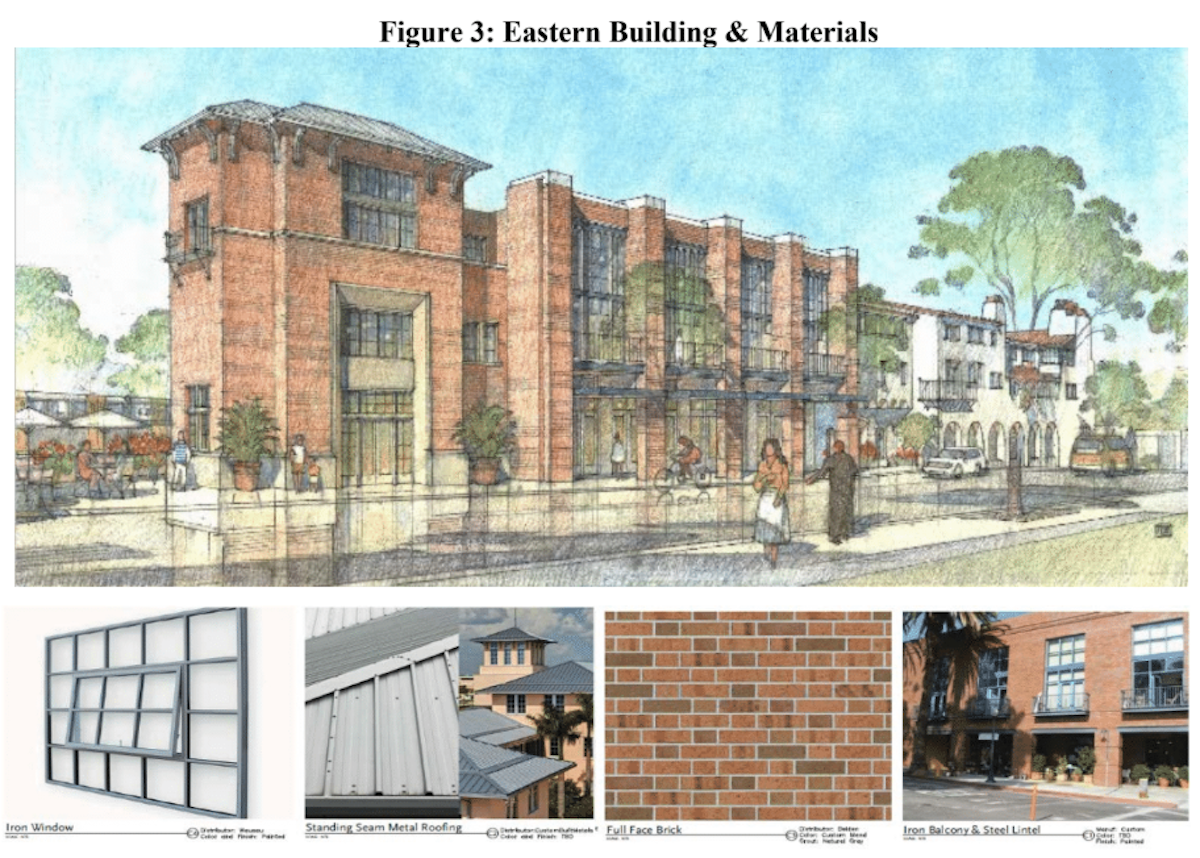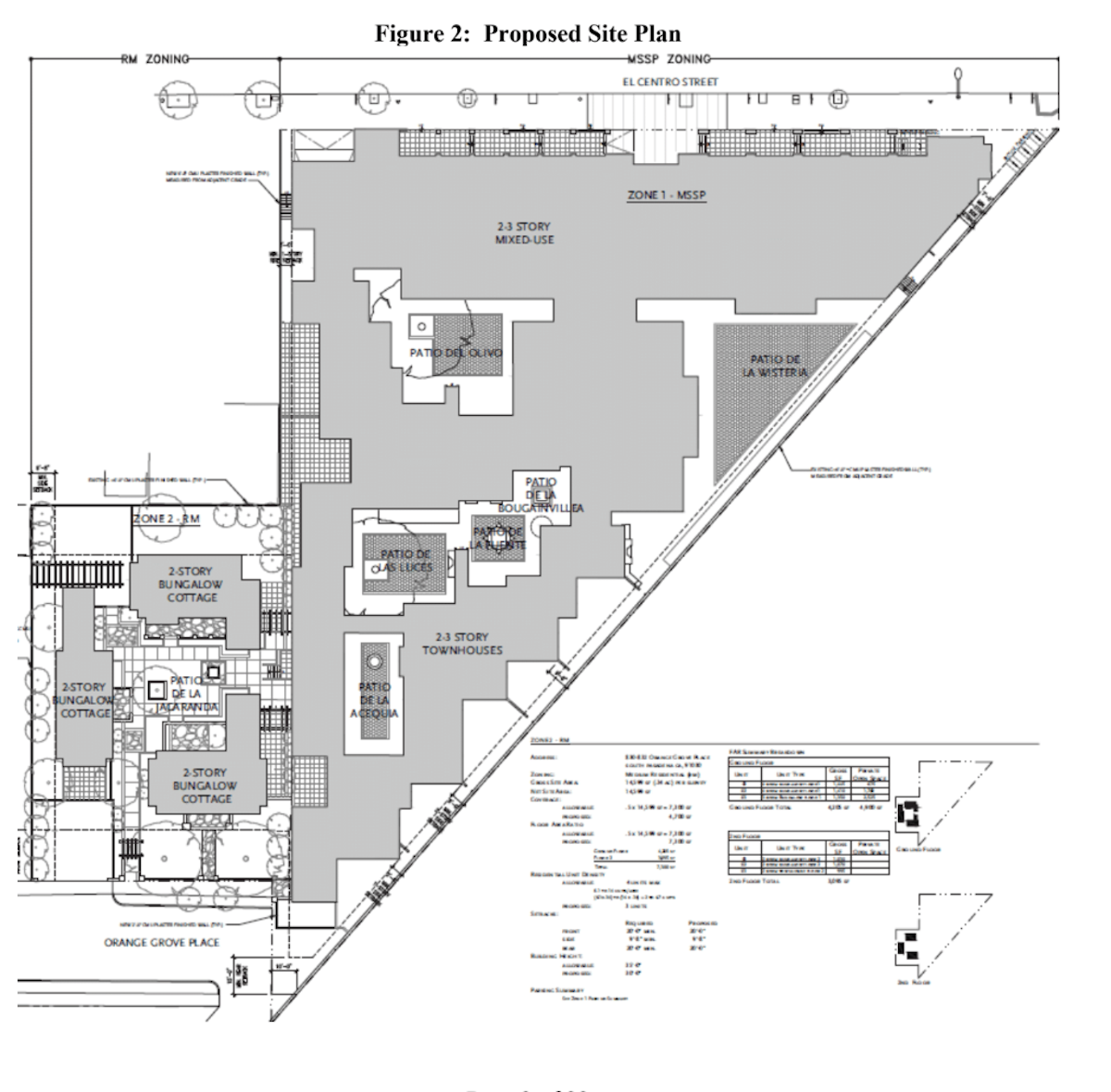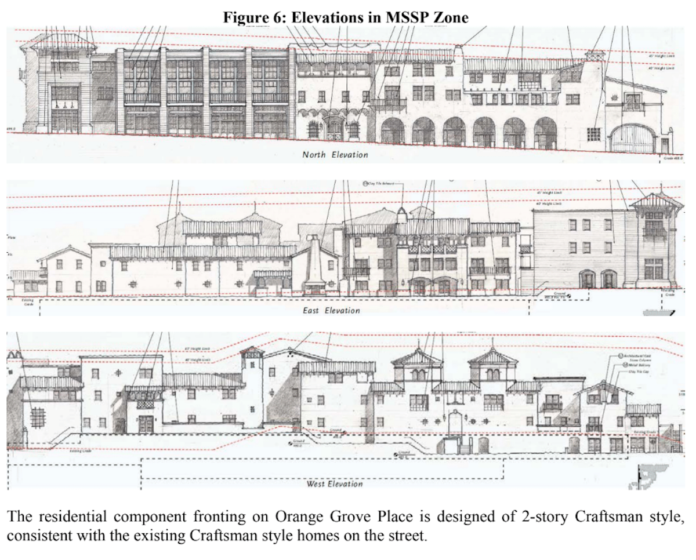While lamenting the failure to include any affordable housing units, the five-member South Pasadena Planning Commission on Tuesday unanimously approved Odyssey Development Services’ 57-unit, mixed-use Seven Patios development. It will be located on a triangular, 1.6-acre site in the Mission Street District on the south side of El Centro St., its eastern boundary abutting the Gold Line. After an existing three-story office building is removed, there will also be three, two-story townhomes and 6,000 square-feet of retail space, including a 2,000 square-foot “boutique” restaurant.
The project, in development for several years, features seven courtyards, each with its own style and named after a different tree. It’s a “very verdant project,” said architect Stefanos Polyzoides, and will “give life to the heart of the city.”
Seven Patios is “just one of many housing developments the City has approved in recent months in downtown South Pasadena that provide no units affordable for low-income households,” noted a comment signed by 22 local housing advocates. The project, it says, is “a step in the wrong direction.”

Commissioner Laura Dahl noted it is “unfortunate and not a good look for us” to approve such a large project with zero affordable units, since the city just filed an appeal to reduce by nearly half the 2,062 affordable units the state is requiring it to plan for over the next eight years.
In the appeal, the city insists it is “committed to housing affordability” and cites its “efforts over the past several years to creatively address the housing crisis in California.”
“I hope this is the last project that we receive that does not have affordable housing,” said Commissioner Lisa Padilla, who said the problem is the city has no inclusionary ordinance, which would establish affordable housing set-aside requirements.

Seven Patios’ lack of affordable units “is in some ways a travesty,” added Commissioner John Lesak. But at the same time “some of that is shame on us because we don’t have inclusionary housing.”
Commission Chair Janet Braun agreed, but said “there really isn’t anything we can insist on at this time.”
“City Council members and Planning Department staff have promised South Pasadena residents an inclusionary zoning ordinance for well over a year,” the housing advocates noted in their comment letter. “What is the hold up?”

South Pasadena, which hadn’t approved a major housing development in 20 years, approved three large projects this year with a total of 182 units. One of these was the 86-unit 625 Fair Oaks project. The developer, Greenbridge Investment Partners, availed itself of the state’s Density Bonus law to provide 13 affordable units in exchange for being able to add additional market-priced units.
One of the projects neighbors’ biggest concerns was traffic, but the study completed for the project found the development won’t have any impact on traffic. City Planning Manager Kanika Kith said the parking and traffic concerns neighbors raised in their comments refer to “existing conditions.” That’s why staff recommended, and the commission agreed to refer these “non-project” traffic concerns for review by the city’s Mobility, Transportation and Infrastructure Commission (MTIC) for evaluation.

In what city attorney Teresa Highsmith said was an attempt to “appease” neighbors, if the Planning and MTIC chairs agree, the developer will be required, after the building is occupied, to pay for a study—not expected to cost more than $10,000–on the traffic impacts. After a long discussion, it was made clear that if the study finds mitigation measures are needed, the developer will not be responsible for their cost.
In addition to a Nov. 6 final Mitigated Negative Declaration that states the project plan “adequately addresses” construction noise and other impacts, the Commission approved permits for conditional use, design review, removal of 20 trees and a tract map consolidating three parcels. The conditional use permit includes a total of 195 conditions, including 48 set by the Planning Department, 45 by Public Works, 76 by the Building and Safety Division, 27 by the Fire Department and six by the Police Department.
The Commission also adopted some modifications to the conditions concerning construction parking rules; a nearby bike lane; and, after a long discussion, the specifications for electric vehicle charging capacity. All parking slots for residents will include the wiring needed to install a charging station, but the requirement for the number of charging stations at slots for non-residents will be referred to the Mobility Commission.















.png)








On Thursday, the same planning commissioners failed to appear for a special meeting called to discuss the inclusionary housing ordinance that they have all been promising for well over a year. Actually, that’s not even true. Inclusionary housing was part of the original General Plan Draft that got side railed by Stephanie De Wolfe et al. in 2018.
While the Planning Commission and The Squad cow towed to developers of luxury housing (Please reference Moffat private road construction), zero housing policies have ever been considered that would benefit renters and workers.
While several of the Planning Commission members, including the Chair, like to call themselves “Liberals” and some even “Progressives”, their actions scarcely reflect their so called values. The Planning Commission, the Planning Department Director and most of the City Council, except for Steve Rossi, are grossly out of touch.
While Diana Mahmud monotonously lectures residents on being vigilant about wearing masks, her concern was not for the parents who have to stay to home from work to help their kids with online school, independent contractors, food service workers or even front line workers. Her concern was for local businesses.
I will remind this community again, that the majority of people who make up this unicorn of a city, are RENTERS! Big real estate, investors and bad acting landlords can’t wait to throw out their tenants so that they can raise rents and displace our neighbors and local students with wealthier transient tenants. Maybe that’s the end game with South Pasadena power brokera: use the pandemic as an opportunity to get rid of low income people so that South Pas can stay wealthy, and predominantly White.
As housing advocates we are making selfless and stellar efforts to work with the local government and its representatives to enact policy that will serve the majority of South Pasadenans. At every turn, and every level, however, it seems like the City of South Pasadena and those who are elected by us, aren’t interested in serving anyone who does not own a business (most of whom do not live in South Pasadena), or own property.
December 26, the day after Christmas, CARES funding for unemployment expires and South Pasadena still does not have a housing element or an eviction ordinance. Wear a mask, social distance and keep our local small business owners and landlords flush, that’s the message we keep getting from the City this holiday season.
The Planning Commission and what’s left of The Squad really don’t care. Do you?
Be best, Planning Commissioners and Diana Mahmud, be best.